Digital Marketing: Critical Evaluation of IHRM in Global Business
VerifiedAdded on 2023/01/06
|12
|863
|47
Report
AI Summary
This report provides an overview of Human Resource Management (HRM) practices within international businesses, focusing on the strategic role HRM plays in motivating the workforce and achieving organizational goals in a global context. It highlights the key practices of International Human Resource Management (IHRM), including recruitment and selection, training and development, and performance management. The report emphasizes the challenges and methods involved in recruiting qualified and motivated employees at a global level, the importance of language and cultural awareness training, and the continuous monitoring and feedback mechanisms crucial for effective performance management. The conclusion underscores the increasing responsibility of HRM in managing employees across the world due to technological advancements and globalization, ensuring effective coordination between host and domestic countries.

Digital Marketing
Paraphrase This Document
Need a fresh take? Get an instant paraphrase of this document with our AI Paraphraser
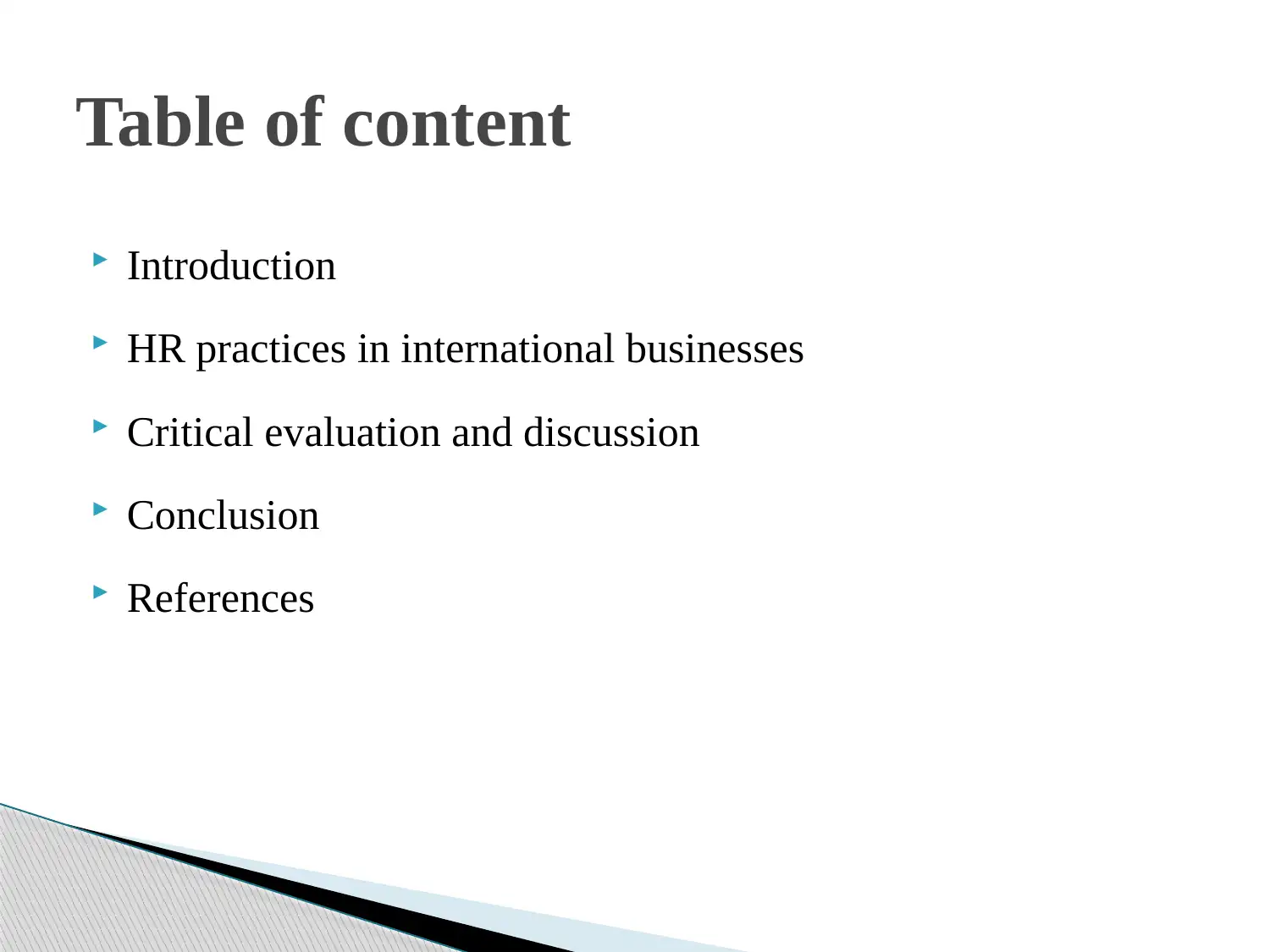
Introduction
HR practices in international businesses
Critical evaluation and discussion
Conclusion
References
Table of content
HR practices in international businesses
Critical evaluation and discussion
Conclusion
References
Table of content
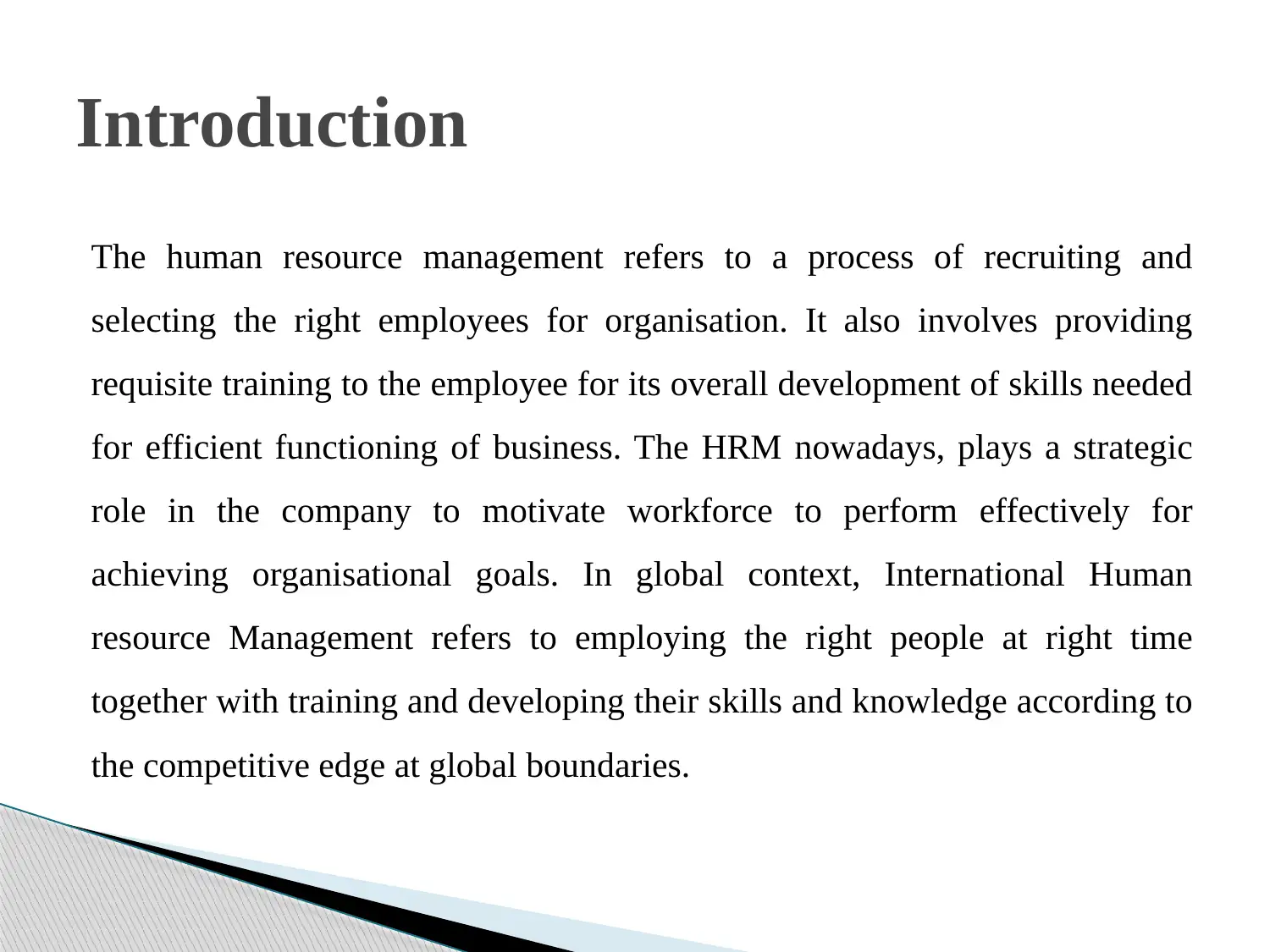
The human resource management refers to a process of recruiting and
selecting the right employees for organisation. It also involves providing
requisite training to the employee for its overall development of skills needed
for efficient functioning of business. The HRM nowadays, plays a strategic
role in the company to motivate workforce to perform effectively for
achieving organisational goals. In global context, International Human
resource Management refers to employing the right people at right time
together with training and developing their skills and knowledge according to
the competitive edge at global boundaries.
Introduction
selecting the right employees for organisation. It also involves providing
requisite training to the employee for its overall development of skills needed
for efficient functioning of business. The HRM nowadays, plays a strategic
role in the company to motivate workforce to perform effectively for
achieving organisational goals. In global context, International Human
resource Management refers to employing the right people at right time
together with training and developing their skills and knowledge according to
the competitive edge at global boundaries.
Introduction
⊘ This is a preview!⊘
Do you want full access?
Subscribe today to unlock all pages.

Trusted by 1+ million students worldwide
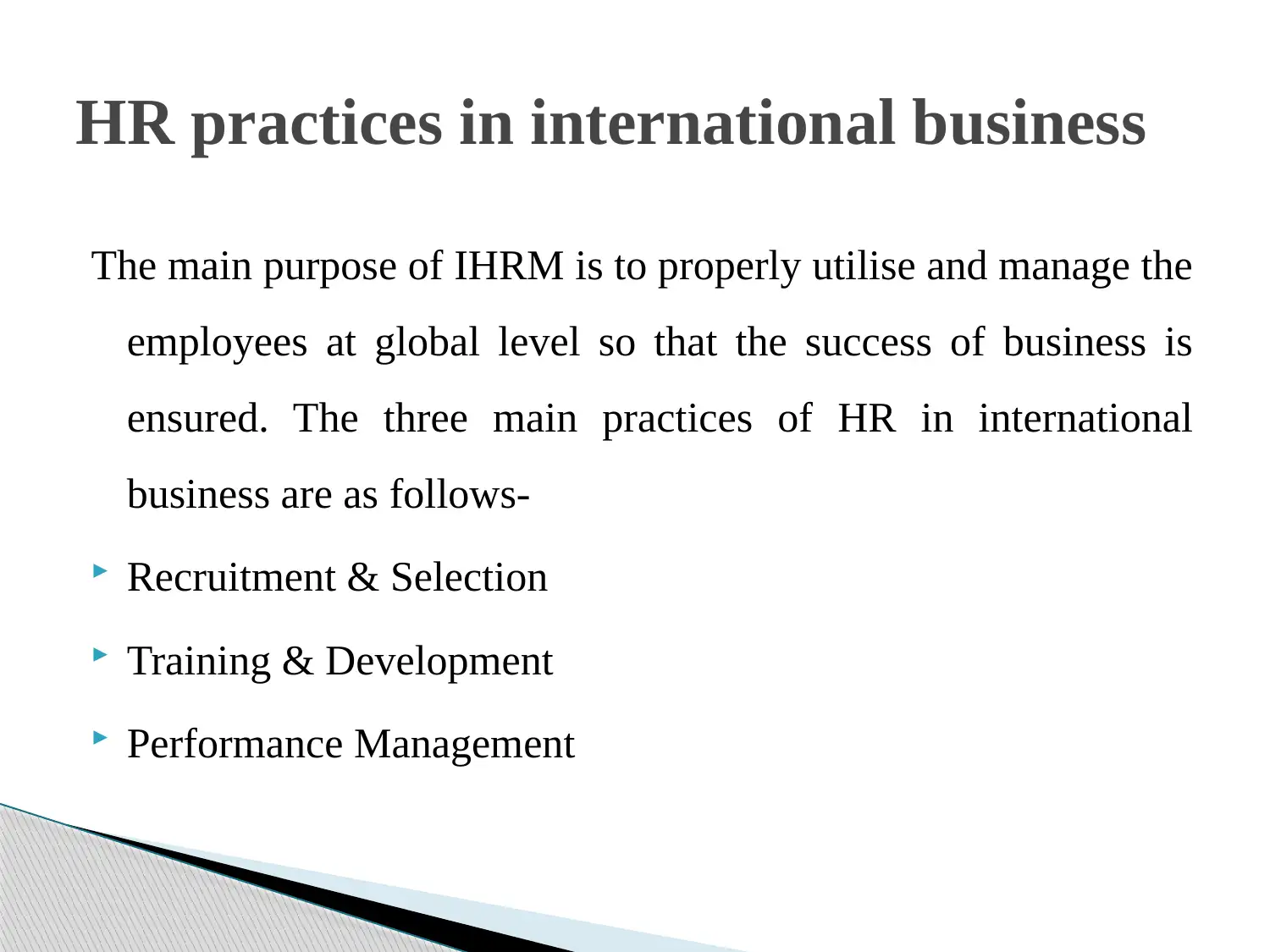
The main purpose of IHRM is to properly utilise and manage the
employees at global level so that the success of business is
ensured. The three main practices of HR in international
business are as follows-
Recruitment & Selection
Training & Development
Performance Management
HR practices in international business
employees at global level so that the success of business is
ensured. The three main practices of HR in international
business are as follows-
Recruitment & Selection
Training & Development
Performance Management
HR practices in international business
Paraphrase This Document
Need a fresh take? Get an instant paraphrase of this document with our AI Paraphraser
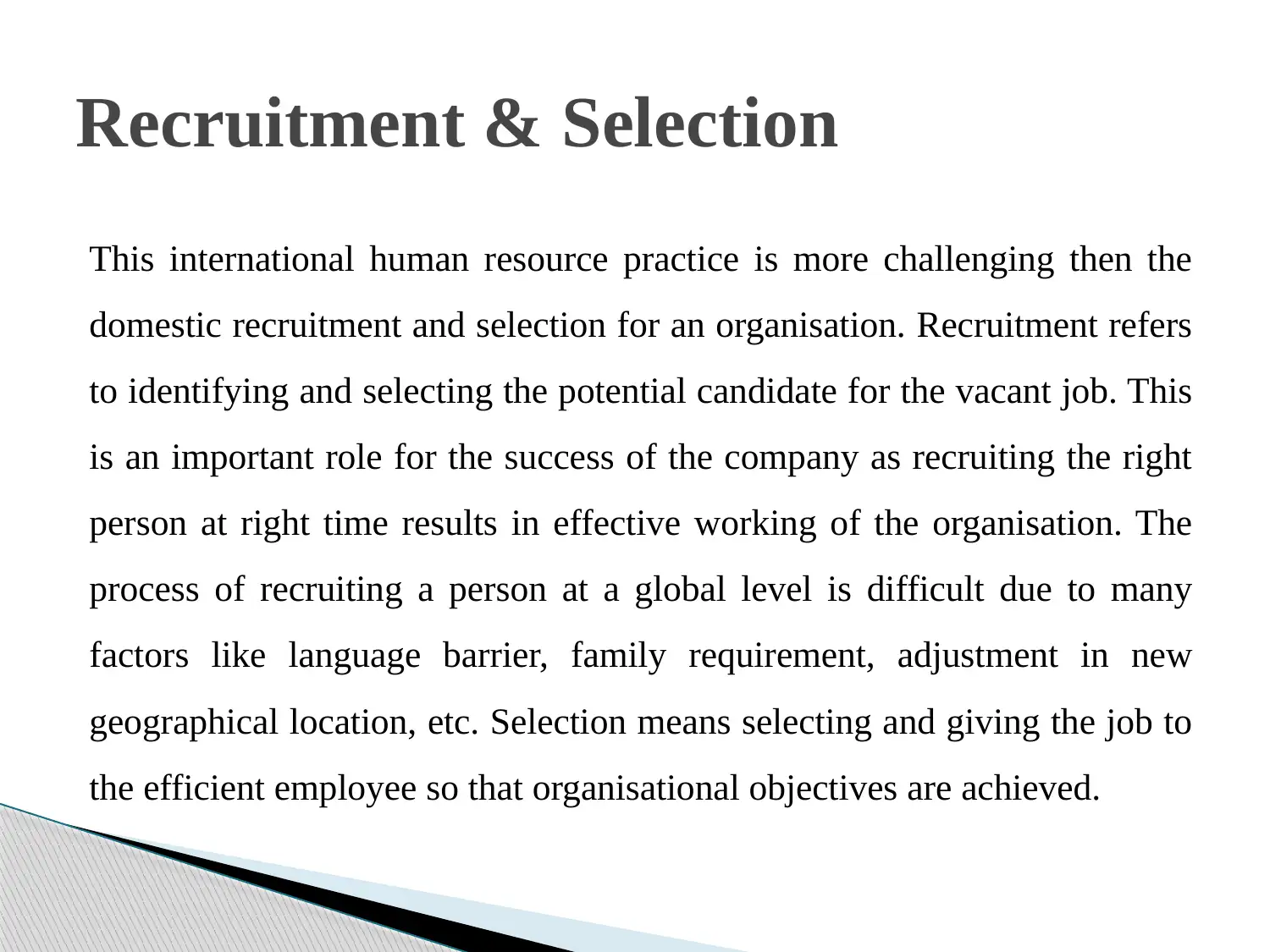
This international human resource practice is more challenging then the
domestic recruitment and selection for an organisation. Recruitment refers
to identifying and selecting the potential candidate for the vacant job. This
is an important role for the success of the company as recruiting the right
person at right time results in effective working of the organisation. The
process of recruiting a person at a global level is difficult due to many
factors like language barrier, family requirement, adjustment in new
geographical location, etc. Selection means selecting and giving the job to
the efficient employee so that organisational objectives are achieved.
Recruitment & Selection
domestic recruitment and selection for an organisation. Recruitment refers
to identifying and selecting the potential candidate for the vacant job. This
is an important role for the success of the company as recruiting the right
person at right time results in effective working of the organisation. The
process of recruiting a person at a global level is difficult due to many
factors like language barrier, family requirement, adjustment in new
geographical location, etc. Selection means selecting and giving the job to
the efficient employee so that organisational objectives are achieved.
Recruitment & Selection
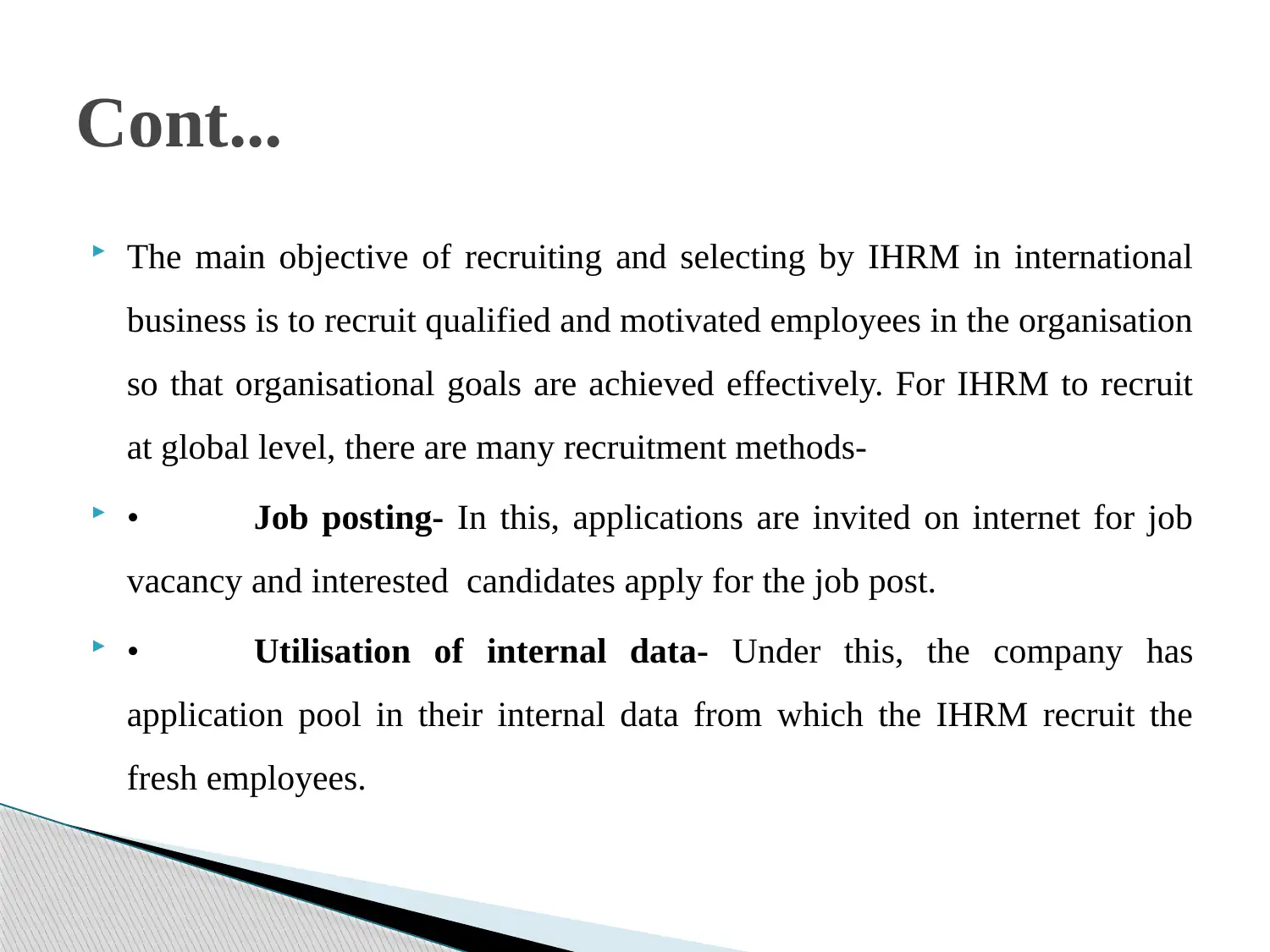
The main objective of recruiting and selecting by IHRM in international
business is to recruit qualified and motivated employees in the organisation
so that organisational goals are achieved effectively. For IHRM to recruit
at global level, there are many recruitment methods-
• Job posting- In this, applications are invited on internet for job
vacancy and interested candidates apply for the job post.
• Utilisation of internal data- Under this, the company has
application pool in their internal data from which the IHRM recruit the
fresh employees.
Cont...
business is to recruit qualified and motivated employees in the organisation
so that organisational goals are achieved effectively. For IHRM to recruit
at global level, there are many recruitment methods-
• Job posting- In this, applications are invited on internet for job
vacancy and interested candidates apply for the job post.
• Utilisation of internal data- Under this, the company has
application pool in their internal data from which the IHRM recruit the
fresh employees.
Cont...
⊘ This is a preview!⊘
Do you want full access?
Subscribe today to unlock all pages.

Trusted by 1+ million students worldwide
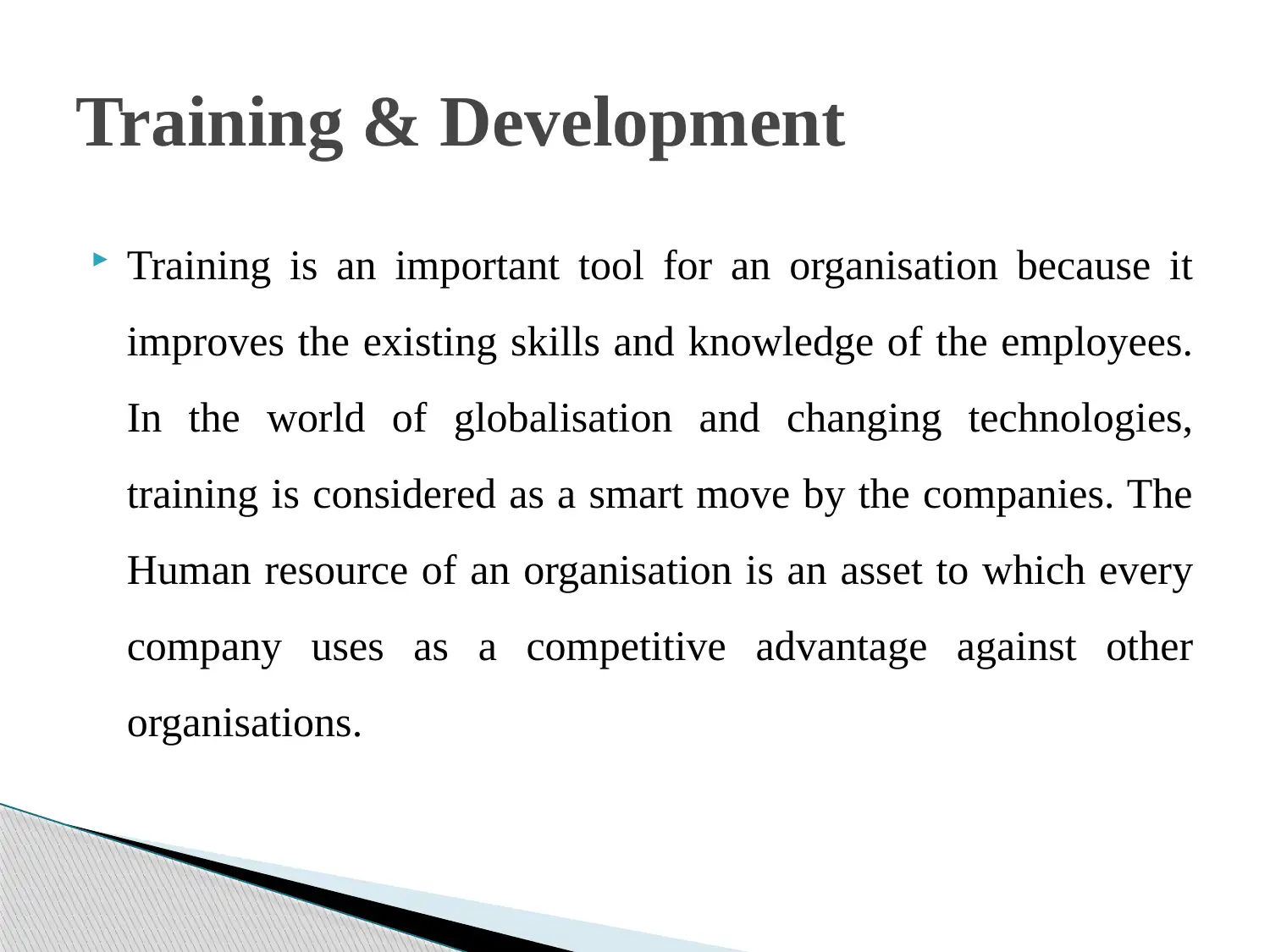
Training is an important tool for an organisation because it
improves the existing skills and knowledge of the employees.
In the world of globalisation and changing technologies,
training is considered as a smart move by the companies. The
Human resource of an organisation is an asset to which every
company uses as a competitive advantage against other
organisations.
Training & Development
improves the existing skills and knowledge of the employees.
In the world of globalisation and changing technologies,
training is considered as a smart move by the companies. The
Human resource of an organisation is an asset to which every
company uses as a competitive advantage against other
organisations.
Training & Development
Paraphrase This Document
Need a fresh take? Get an instant paraphrase of this document with our AI Paraphraser
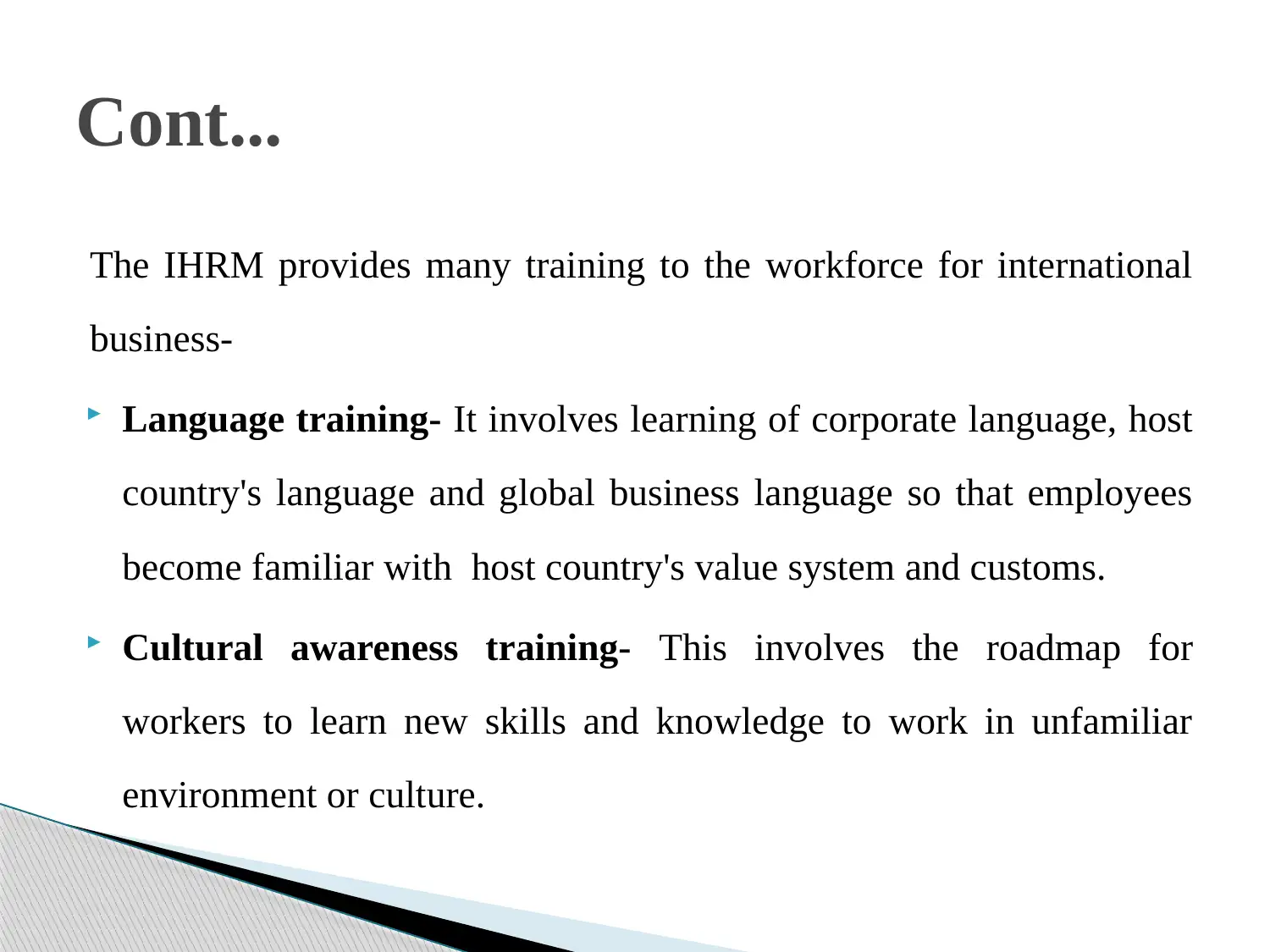
The IHRM provides many training to the workforce for international
business-
Language training- It involves learning of corporate language, host
country's language and global business language so that employees
become familiar with host country's value system and customs.
Cultural awareness training- This involves the roadmap for
workers to learn new skills and knowledge to work in unfamiliar
environment or culture.
Cont...
business-
Language training- It involves learning of corporate language, host
country's language and global business language so that employees
become familiar with host country's value system and customs.
Cultural awareness training- This involves the roadmap for
workers to learn new skills and knowledge to work in unfamiliar
environment or culture.
Cont...
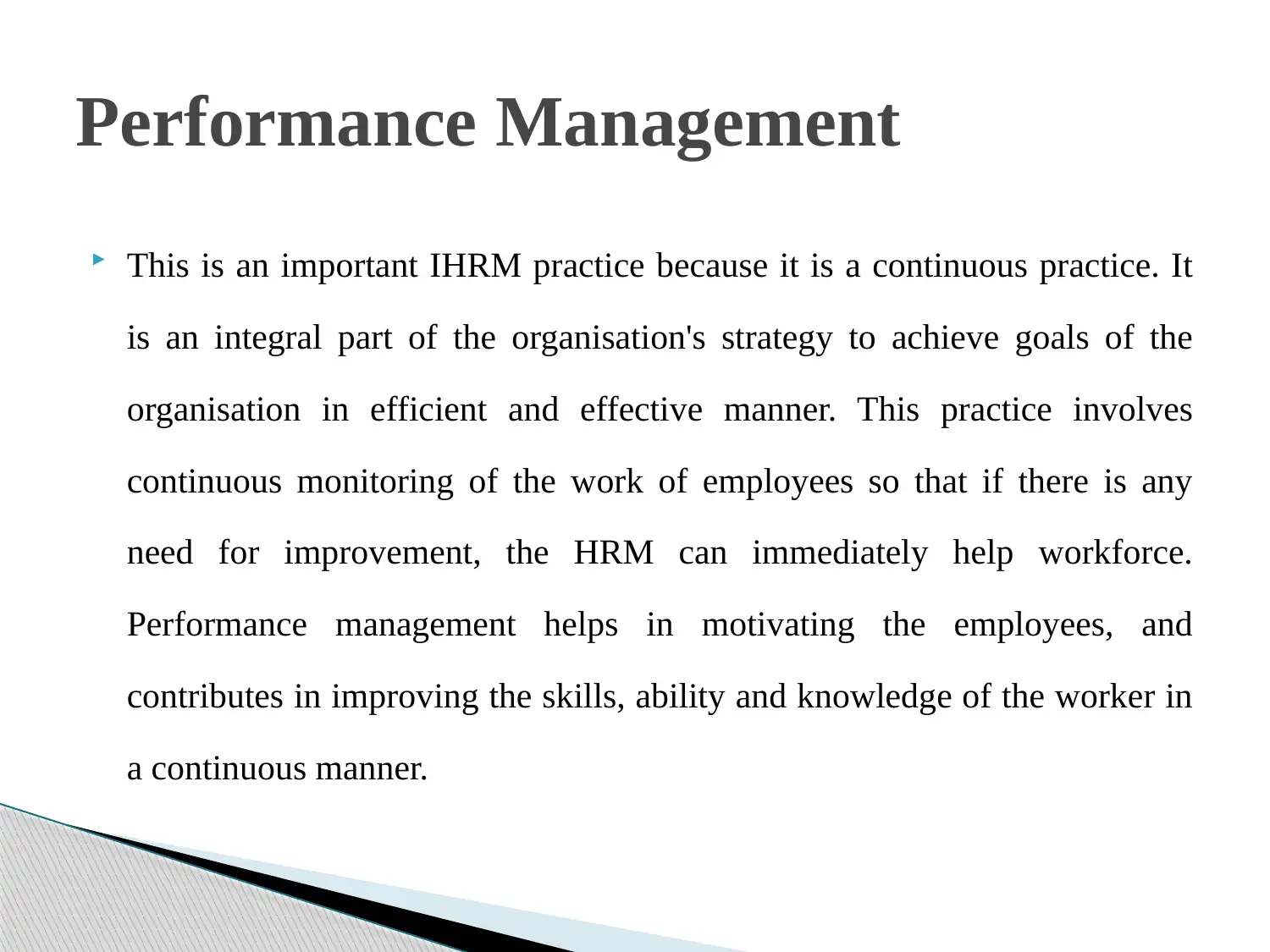
This is an important IHRM practice because it is a continuous practice. It
is an integral part of the organisation's strategy to achieve goals of the
organisation in efficient and effective manner. This practice involves
continuous monitoring of the work of employees so that if there is any
need for improvement, the HRM can immediately help workforce.
Performance management helps in motivating the employees, and
contributes in improving the skills, ability and knowledge of the worker in
a continuous manner.
Performance Management
is an integral part of the organisation's strategy to achieve goals of the
organisation in efficient and effective manner. This practice involves
continuous monitoring of the work of employees so that if there is any
need for improvement, the HRM can immediately help workforce.
Performance management helps in motivating the employees, and
contributes in improving the skills, ability and knowledge of the worker in
a continuous manner.
Performance Management
⊘ This is a preview!⊘
Do you want full access?
Subscribe today to unlock all pages.

Trusted by 1+ million students worldwide
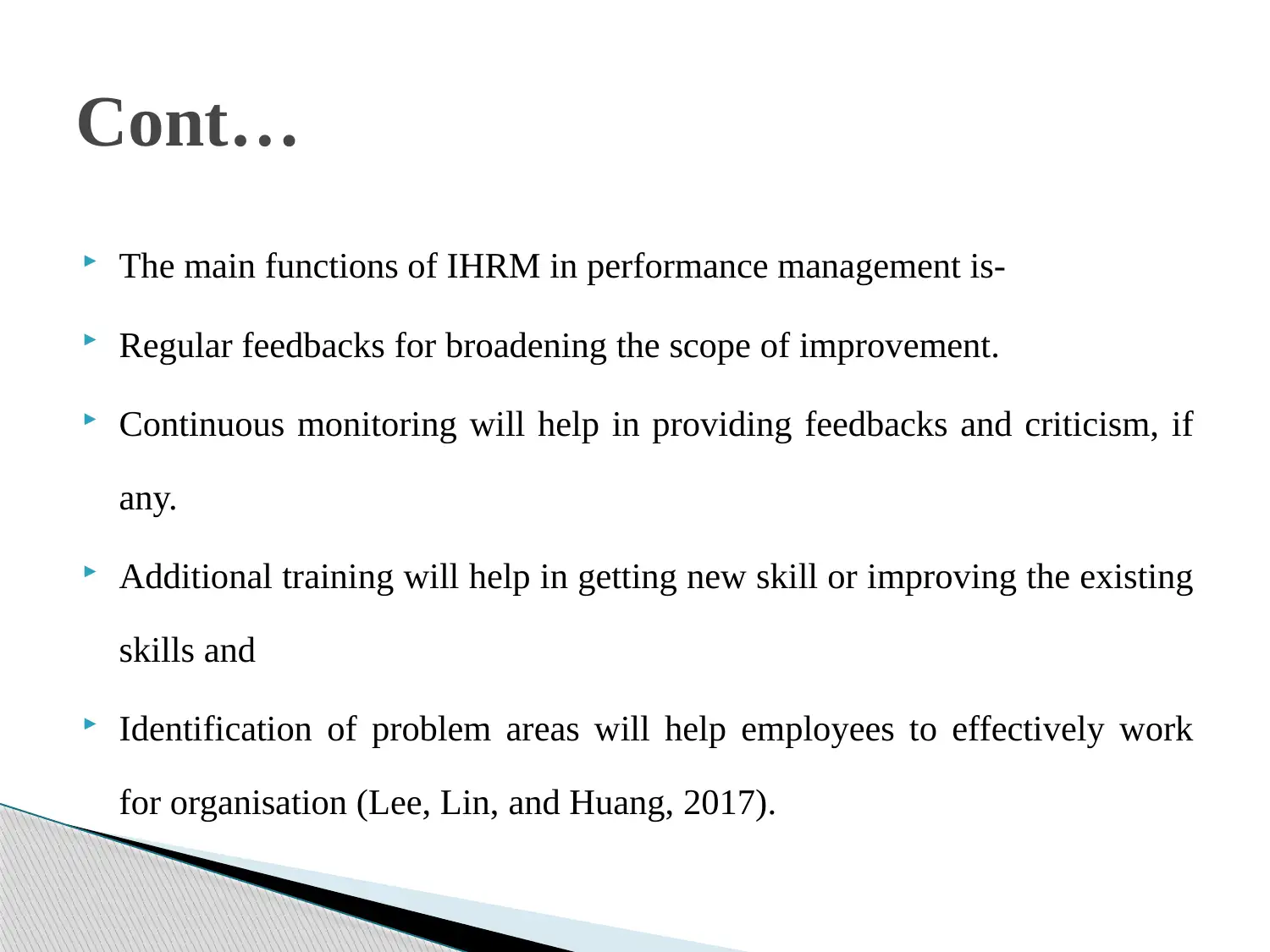
The main functions of IHRM in performance management is-
Regular feedbacks for broadening the scope of improvement.
Continuous monitoring will help in providing feedbacks and criticism, if
any.
Additional training will help in getting new skill or improving the existing
skills and
Identification of problem areas will help employees to effectively work
for organisation (Lee, Lin, and Huang, 2017).
Cont…
Regular feedbacks for broadening the scope of improvement.
Continuous monitoring will help in providing feedbacks and criticism, if
any.
Additional training will help in getting new skill or improving the existing
skills and
Identification of problem areas will help employees to effectively work
for organisation (Lee, Lin, and Huang, 2017).
Cont…
Paraphrase This Document
Need a fresh take? Get an instant paraphrase of this document with our AI Paraphraser
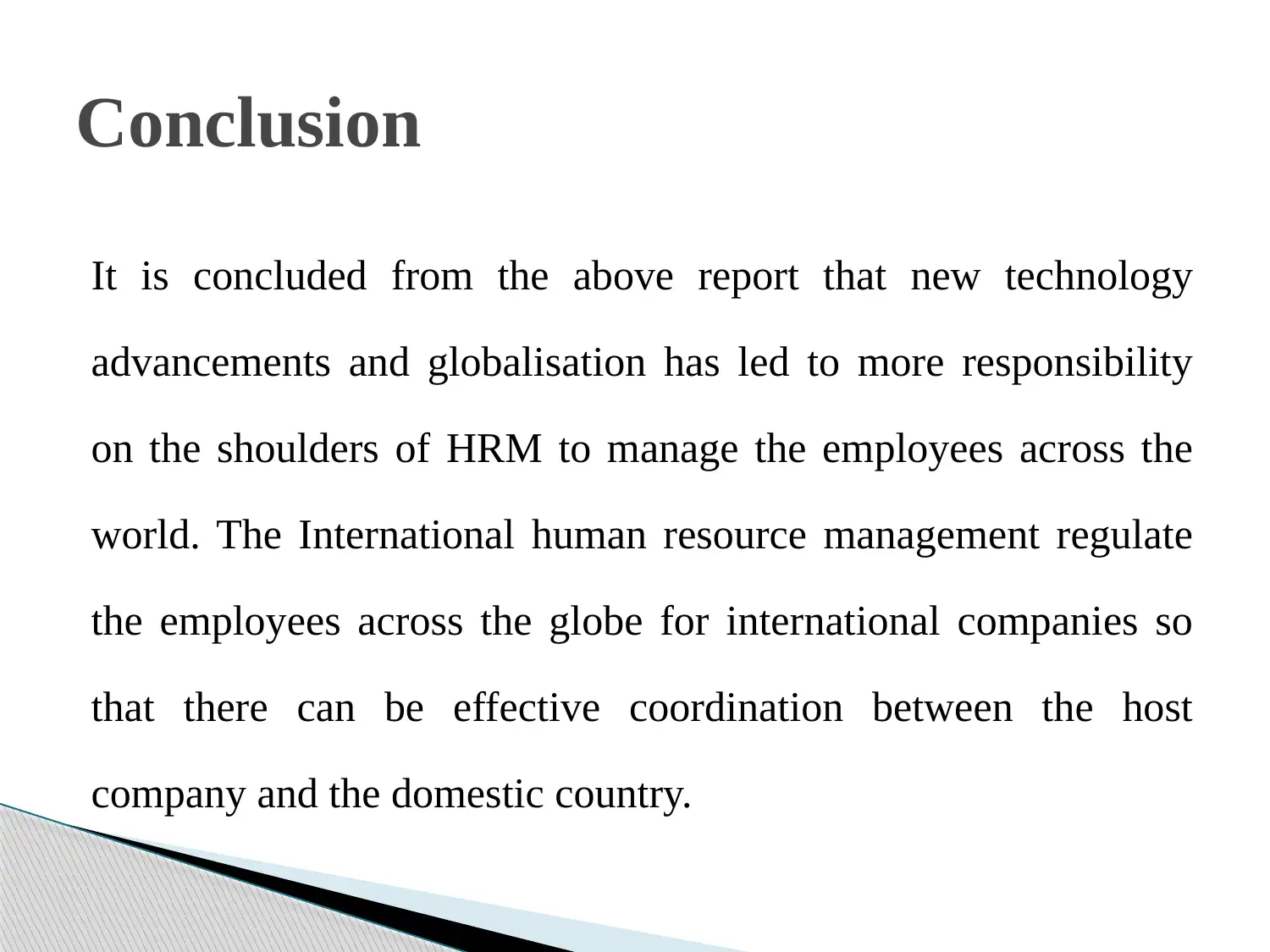
It is concluded from the above report that new technology
advancements and globalisation has led to more responsibility
on the shoulders of HRM to manage the employees across the
world. The International human resource management regulate
the employees across the globe for international companies so
that there can be effective coordination between the host
company and the domestic country.
Conclusion
advancements and globalisation has led to more responsibility
on the shoulders of HRM to manage the employees across the
world. The International human resource management regulate
the employees across the globe for international companies so
that there can be effective coordination between the host
company and the domestic country.
Conclusion
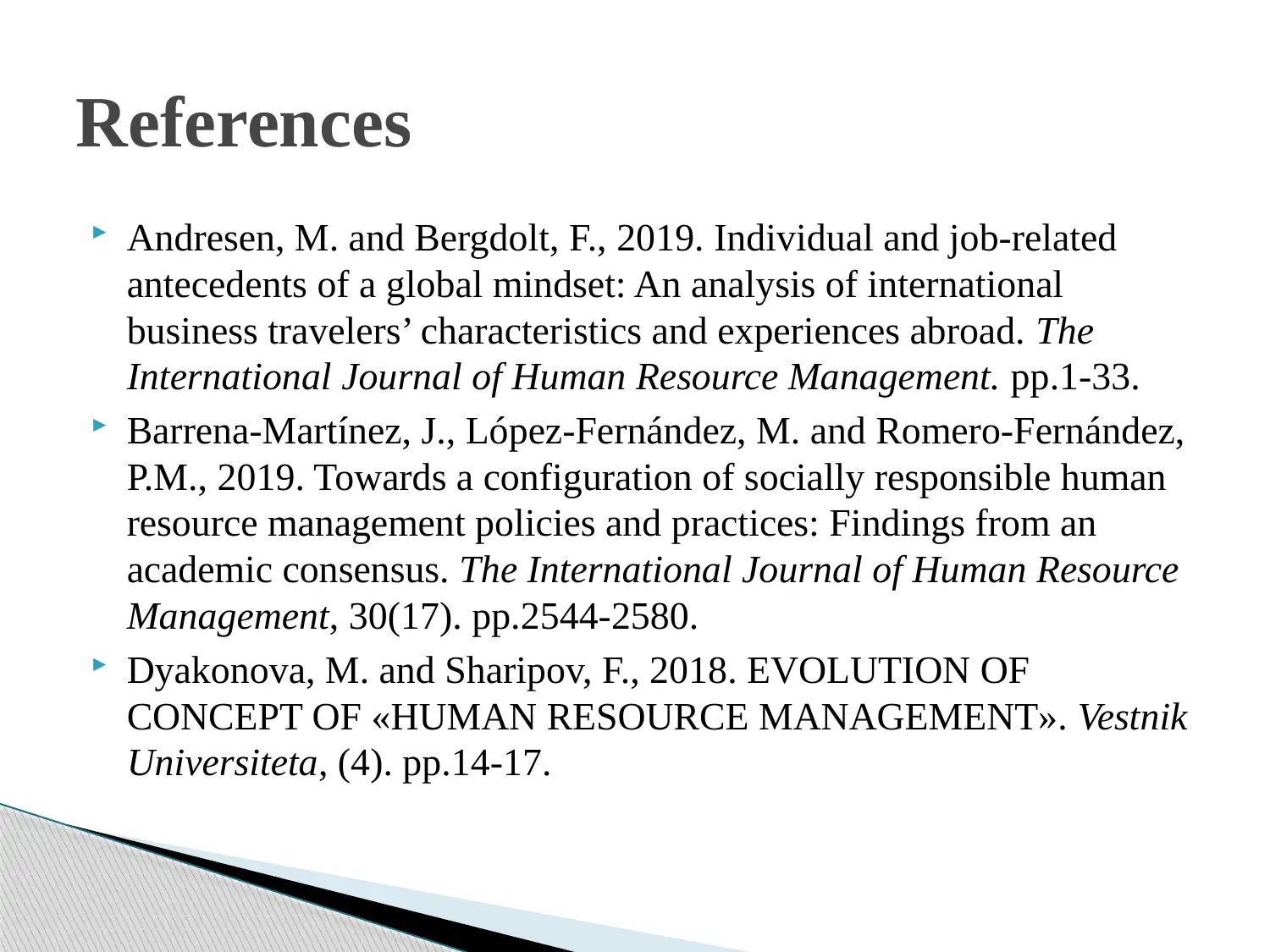
Andresen, M. and Bergdolt, F., 2019. Individual and job-related
antecedents of a global mindset: An analysis of international
business travelers’ characteristics and experiences abroad. The
International Journal of Human Resource Management. pp.1-33.
Barrena-Martínez, J., López-Fernández, M. and Romero-Fernández,
P.M., 2019. Towards a configuration of socially responsible human
resource management policies and practices: Findings from an
academic consensus. The International Journal of Human Resource
Management, 30(17). pp.2544-2580.
Dyakonova, M. and Sharipov, F., 2018. EVOLUTION OF
CONCEPT OF «HUMAN RESOURCE MANAGEMENT». Vestnik
Universiteta, (4). pp.14-17.
References
antecedents of a global mindset: An analysis of international
business travelers’ characteristics and experiences abroad. The
International Journal of Human Resource Management. pp.1-33.
Barrena-Martínez, J., López-Fernández, M. and Romero-Fernández,
P.M., 2019. Towards a configuration of socially responsible human
resource management policies and practices: Findings from an
academic consensus. The International Journal of Human Resource
Management, 30(17). pp.2544-2580.
Dyakonova, M. and Sharipov, F., 2018. EVOLUTION OF
CONCEPT OF «HUMAN RESOURCE MANAGEMENT». Vestnik
Universiteta, (4). pp.14-17.
References
⊘ This is a preview!⊘
Do you want full access?
Subscribe today to unlock all pages.

Trusted by 1+ million students worldwide
1 out of 12
Related Documents
Your All-in-One AI-Powered Toolkit for Academic Success.
+13062052269
info@desklib.com
Available 24*7 on WhatsApp / Email
![[object Object]](/_next/static/media/star-bottom.7253800d.svg)
Unlock your academic potential
Copyright © 2020–2026 A2Z Services. All Rights Reserved. Developed and managed by ZUCOL.




